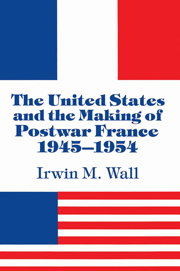Book contents
- Frontmatter
- Contents
- Acknowledgments
- List of abbreviations
- Introduction
- 1 The diplomatic heritage
- 2 The postwar years: Independence compromised
- 3 L'année terrible
- 4 Americanizing the French
- 5 Building an alliance
- 6 The Marshall Plan
- 7 Military aid and French independence
- 8 The United States and French Indochina
- 9 France declares its independence
- Conclusion
- Bibliography
- Index
4 - Americanizing the French
Published online by Cambridge University Press: 04 December 2009
- Frontmatter
- Contents
- Acknowledgments
- List of abbreviations
- Introduction
- 1 The diplomatic heritage
- 2 The postwar years: Independence compromised
- 3 L'année terrible
- 4 Americanizing the French
- 5 Building an alliance
- 6 The Marshall Plan
- 7 Military aid and French independence
- 8 The United States and French Indochina
- 9 France declares its independence
- Conclusion
- Bibliography
- Index
Summary
AMERICAN INFLUENCE AND FRENCH LABOR
American Policy toward the French labor movement until 1947 remained distinct from diplomatic questions between the two governments and Washington's attitude with regard to the internal composition of the French government. The Americans were suspicious but respectful of French neutrality, and they thought it best that the Communists remain in the French government as a guarantee of short-term social stability. But Washington wanted the power of the Communist party over the French labor movement broken. The Americans showed concern over Communist influence in the trade unions even before the end of the Second World War. The State Department maintained an elaborate network of officials in Paris to keep watch over and contact with the various trade unions and political parties of the left. The same concerns characterized American Federation of Labor (AFL), which opened a European office to combat Communist influence on European labor movements late in 1945. The American intelligence services, the OSS, and its successor the CIA, also became involved. While the State Department, AFL, and CIA all pursued their separate and independent activities in France, they tried to cooperate. A formal liaison was established between them in 1947 at the State Department through the office and staff of Raymond Murphy. A hardline anti-Communist, Murphy was a specialist on Communist affairs and an expert in weeding out internal “subversion,” in which capacity he had already worked with the FBI.
- Type
- Chapter
- Information
- Publisher: Cambridge University PressPrint publication year: 1991
- 2
- Cited by

